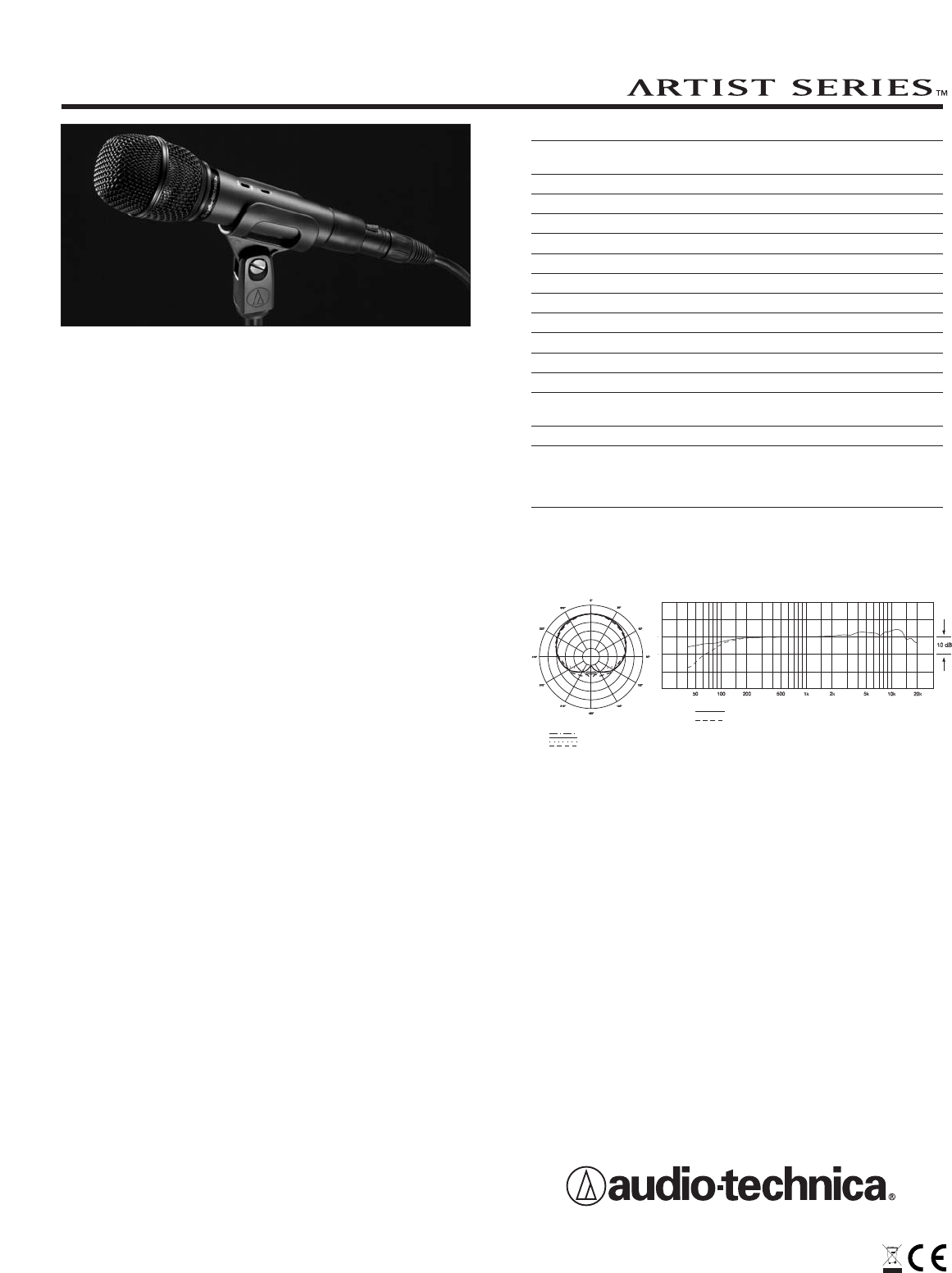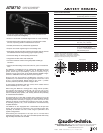
• Tailored for exacting detail, high-fidelity vocal reproduction with
maximum impact and intelligibility
• Excels in venues with controlled stage volume or in-ear monitoring
• Cardioid polar pattern reduces pickup of sounds from the sides
and rear, improving isolation of desired sound source
• Durable performance for professional applications
• Superior anti-shock engineering for low handling noise
• Multi-stage grille design offers excellent protection against plosives
and sibilance without compromising high-frequency clarity
• Condenser design for studio-quality performance
• Integral 80 Hz HPF switch and 10 dB pad
• Corrosion-resistant contacts from gold-plated XLRM-type
connector
• Rugged, all-metal design and construction for years of trouble-free
use
The ATM710 is intended for use in professional applications where
remote power is available. It requires 11V to 52V DC phantom
power, which may be provided by a mixer or console, or by a
separate, in-line source such as the Audio-Technica AT8801 single-
channel or CP8506 four-channel phantom power supplies.
Output from the microphone's XLRM-type connector is low
impedance (Lo-Z) balanced. The signal appears across Pins 2 and
3;
Pin 1 is ground (shield). Output phase is “Pin 2 hot” – positive
acoustic pressure produces positive voltage at Pin 2.
To avoid phase cancellation and poor sound, all mic cables must be
wired consistently: Pin 1-to-Pin 1, etc.
When using the ATM710 in settings with a stage monitor speaker,
the speak
er should be located 180° off axis (at rear of the
microphone). This placement, in conjunction with the microphone's
uniform cardioid pickup pattern, will virtually eliminate the possibility
of undesired audio f
eedbac
k.
An integral 80 Hz hi-pass filter provides easy switching from a flat
frequency response to a low-end roll-off. The roll-off position reduces
the microphone's sensitivity to popping in close vocal use. It also
reduces the pickup of low-frequency ambient noise (such as traffic,
air-handling systems
, etc.), room reverberation and mechanically
coupled vibr
ations
.
The A
TM710 is also equipped with a s
witchable 10 dB pad that
lowers the microphone's sensitivity, thus providing higher SPL
capability for flexible use with a wide range of performers and
system configurations.
Avoid leaving the microphone in the open sun or in areas where
temperatures exceed 110° F (43° C) for extended periods. Extremely
high humidity should also be a
v
oided.
Audio-Technica U.S., Inc., 1221 Commerce Drive, Stow, Ohio 44224
Audio-Technica Limited, Old Lane, Leeds LS11 8AG England
www.audio-technica.com
P51806 ©2006 Audio-Technica U.S., Inc. Printed in China
ATM710
ATM710 SPECIFICATIONS
†
ELEMENT Fixed-charge back plate
permanently polarized condenser
POLAR PATTERN Cardioid
FREQ
UENCY RESPONSE
40-20,000 Hz
LOW FREQUENCY ROLL-OFF 80 Hz, 12 dB/octave
OPEN CIRCUIT SENSITIVITY –40 dB (10.0 mV) re 1V at 1 Pa*
IMPEDANCE 200 ohms
MAXIMUM INPUT SOUND LEVEL 148 dB SPL, 1 kHz at 1% T.H.D.
DYNAMIC RANGE (typical) 127 dB, 1 kHz at Max SPL
SIGNAL-TO-NOISE RATIO
1
73 dB, 1 kHz at 1 Pa*
PHANTOM POWER REQUIREMENTS 11-52V DC, 3.5 mA typical
SWITCHES Flat, roll-off; 10 dB pad
WEIGHT 274 g (9.7 oz)
DIMENSIONS 179.0 mm (7.05") long,
50.0 mm (1.97") diameter
OUTPUT CONNECT
OR
Integ
ral 3-pin XLRM-type
ACCESSORIES FURNISHED AT8470 Quiet-Flex
™
stand clamp
for
5
/
8
"-27 threaded stands;
5
/
8
"-27 to
3
/
8
"-16 threaded adapter
;
soft protective pouch
†In the interest of standards development, A.T.U.S. offers full details on its test
methods to other industry professionals on request.
*1 Pascal = 10 dynes/cm
2
= 10 microbars = 94 dB SPL
1
Typical, A-weighted, using Audio Precision System One.
Specifications are subject to change without notice.
CARDIOID CONDENSER
VOCAL MICROPHONE
8 kHz
Polar Pattern
SCALE IS 5 DECIBELS PER DIVISION
LEGEND
200 Hz
1 kHz
5 kHz
F
requency in Hertz
LEGEND
12" or more on axis
Roll-off
Frequency Response
Response in dB



